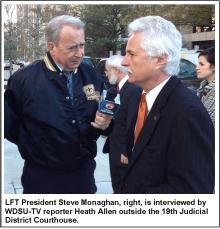
The Louisiana Federation of Teachers first filed suit to overturn Act 2 of the 2012 legislature on June 7, and was joined shortly thereafter by the Louisiana School Boards Association and the Louisiana Association of Educators.
At the time, LFT President Steve Monaghan criticized both the substance of Act 2 and the way in which the legislative process was abused in order to pass it.
“In the haste to steamroll this bill through the legislature, the Constitution was often treated like little more than a list of inconvenient suggestions,” Monaghan said.
Last July, a request for an injunction to prevent the law from going into effect was rejected by 19th Judicial District Judge Tim Kelly, who will also preside in today’s trial. The judge said at the time that his ruling would have no effect on the ultimate outcome of the lawsuit.
Judge Kelly based his ruling on two statements, signed by State Superintendent of Education John White and Commissioner of Administration Paul Rainwater. Their affidavits claimed that the injunction requested by the LFT and others would cause the state to have deficit spending.
The judge said that he does not have the legal authority to question the validity of the affidavits, and must accept them. If White and Rainwater deliberately misled the court in their document, he said, they could “be found in contempt of court for filing a false document.”
The State Supreme Court upheld Judge Kelly’s ruling in August, and the school voucher program included in Act 2 went into effect when schools opened that month.
Procedurally, the LFT opposes Act 2 because it bundled numerous objectives in one bill, in violation of the state constitution.
“By cramming so many objectives into the bill, public comment and debate were stifled,” Monaghan said. “Legislators were given little information about the bill, and appeared intimidated into passing it without adequate debate and oversight.”
Substantively, LFT opposes Act 2 because it radically redefines public education, siphoning funds away from public schools and into private and religious schools, as well as the pockets of investment bankers, business and industry providers and virtual, online schools that will be extremely difficult to regulate.
The act violates the state constitution, which clearly states that public education funds “shall be used to determine the cost of a minimum foundation program of education in all public elementary and secondary schools as well as to equitably allocate the funds to parish and city school systems.”
The Federation’s objections to Act 2 extend to the legislature’s adoption of public education’s funding mechanism, the $3.41 billion Minimum Foundation Program. The resolution barely passed the House of Representatives on a 51-49 vote. Because the MFP resolution has the force of law, Monaghan said, it should have required at least 53 votes to pass. It can be argued that a two-thirds majority vote was necessary because of the late date at which the MFP was considered.
